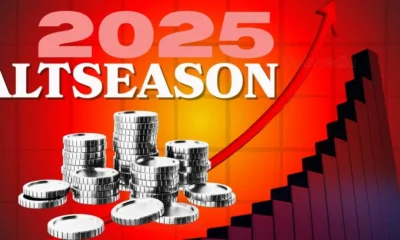Web 3
Japan’s crypto paralysis is cultural; tax cuts won’t fix it

Credit : cryptoslate.com
The next article is a visitor publish and an opinion of Maksym Sakharov, Co-founder and CEO by Wefi
Final month, the Japanese monetary service company proposed a wholesaler for reclassification of cryptocurrencies that may introduce a flat load of 20% on the revenue of digital property and would assist in introducing crypto change funds.
For a very long time, the progressive tax system of the nation has imposed levies on crypto -winsts at a most of 55%, an element that many really feel, makes investing in crypto fairly unattractive.
Institutionalized slowness
Nonetheless, this isn’t the one impediment within the path of a possible Bitcoin ETF approval in Japan; It’s not even probably the most pressing. On the finish of final 12 months, Prime Minister Shigeru Ishiba apparently rejected The thought of crypto ETFs, questioning whether or not the federal government ought to promote digital property equivalent to conventional investments.
His prevailing coalition misplaced his majority within the greater home after a bruising match that noticed them fall three seats that shy for the 50 wanted to retain their benefit. However even when the political management is in steadiness and Ishiba guarantees to remain, whatever the election end result, one factor remained constant: the deep-rooted warning of Japan.
The non -binding perspective of ISHIBA on ETF approvals is only a symptom of a deeper malaise. The regulatory reflex of the nation isn’t just about shopper security – it’s a couple of deep -rooted compliance tradition that has dangers proof against all dangers in any respect prices. This mentality, not the a lot malignant 55% crypto tax, is what actually stifles innovation.
The irony is that Japan as soon as was forward of neighbors equivalent to South Korea and Hong Kong. The acknowledged crypto as a method of fee in 2017 and constructed among the world’s earliest regulatory infrastructure. Moreover, Metaplanet will begin a wave of Bitcoin purchases by Japanese listed firms within the second quarter of 2024, Gather a treasury Definitely worth the final rely of just about $ 2 billion in BTC. And that is not all. Progress has additionally been made within the improvement of stablecoins and crypto fee infrastructure, during which Sumitomo MITUI signed a mou with AVA laboratories and fireplace blocks in preparation to publish Fiat-Pegged cryptocurrencies.
But a bureaucratic labyrinth -killing firms lies underneath these obvious success tales. Beneath the present framework, small startups with desires of providing digital asset providers have discovered it tough to fulfill the strict necessities that embrace intensive documentation, an area checking account, a compliance workforce established in Japan and at the least 10 million yen in capital.
Some can declare that the foundations are there to guard customers, and that’s legitimate. However could not there be a contented steadiness between shopper safety and play space for innovation? It virtually feels just like the FSA isolates regulators of builders, the place pencil parders design guidelines with out testing them in opposition to Actual-World technical limitations.
If taxes have been the actual barrier for web3 innovation, the proposed reforms of the FSA would ignite a tree.
Roadmap reform
In an effort to run compliance with the competitiveness, Japan has to re -wip a few of his lengthy -term approaches. To start with, the federal government should assume the pre-approval mannequin of solar sins and a sooner system with which launch tokens with post-launch audits can change. Right here tokens merely need to adjust to the success establishment and the necessities for safety that have to be said. Full regulatory and technical audits can then be carried out inside 30 days of the launch. On this means, investor safety continues to be saved by enforceable audits sanctions and deletion authority, whereas on the identical time dramatically reduces the lead instances.
The nation’s supervisors should additionally launch dynamic sandboxes that may use zero information for privacy-safe verification. There’s additionally a necessity for capital injection of the state. Japan might create an FSA-Match fund of $ 500 million that instantly helps web3 startups that meet safety benchmarks, which successfully will get some pores and skin within the sport.
Lastly, to advertise cooperation and to shake off his bureaucratic insulation, the monetary regulator was in a position to attain the positioning of the founders of Tech in his advisory councils. This could look in the beginning at ache factors in trade, in order that the coverage can type with the top person in thoughts as a substitute of being defensive, standing quo-retention of ideas.
These aren’t radical necessities. They’re already commonplace within the jurisdictions that are actually main international crypto acceptance.
Builders watch. With populist events equivalent to Sanseito Traction The political winds shift on “Japan First” rhetoric. If the coalition of ISHIBA falls, a brand new administration can herald a extra innovation -friendly period. However provided that the regulators of Japan are turning away from their threat -aging DNA. With out that shift, tax reform will likely be beauty, ETFs will stay at midnight and the early good thing about Japan in Crypto in historical past will fade.
State on this article
-

 Analysis4 months ago
Analysis4 months ago‘The Biggest AltSeason Will Start Next Week’ -Will Altcoins Outperform Bitcoin?
-

 Blockchain1 year ago
Blockchain1 year agoOrbler Partners with Meta Lion to Accelerate Web3 Growth
-

 Meme Coin10 months ago
Meme Coin10 months agoDOGE Sees Massive User Growth: Active Addresses Up 400%
-

 Videos1 year ago
Videos1 year agoShocking Truth About TRON! TRX Crypto Review & Price Predictions!
-

 NFT1 year ago
NFT1 year agoSEND Arcade launches NFT entry pass for Squad Game Season 2, inspired by Squid Game
-

 Web 34 months ago
Web 34 months agoHGX H200 Inference Server: Maximum power for your AI & LLM applications with MM International
-

 Meme Coin1 year ago
Meme Coin1 year agoCrypto Whale Buys the Dip: Accumulates PEPE and ETH
-

 Videos6 months ago
Videos6 months agoStack Sats by Gaming: 7 Free Bitcoin Apps You Can Download Now































